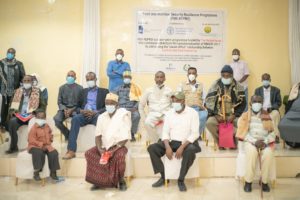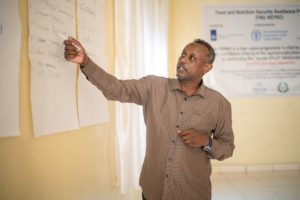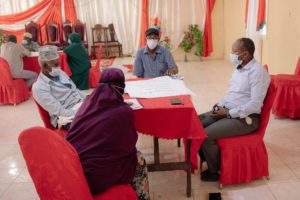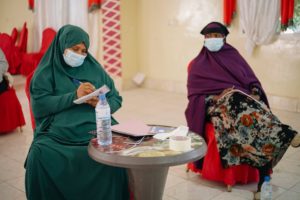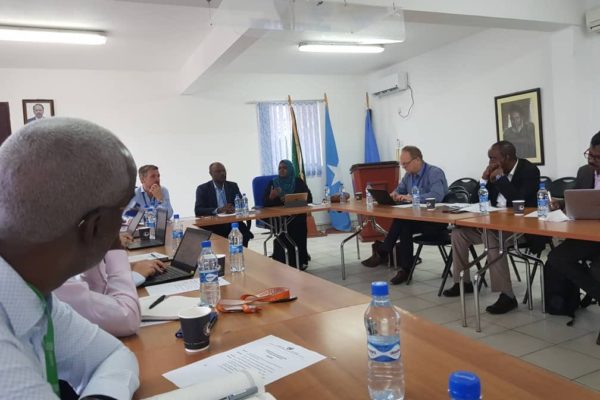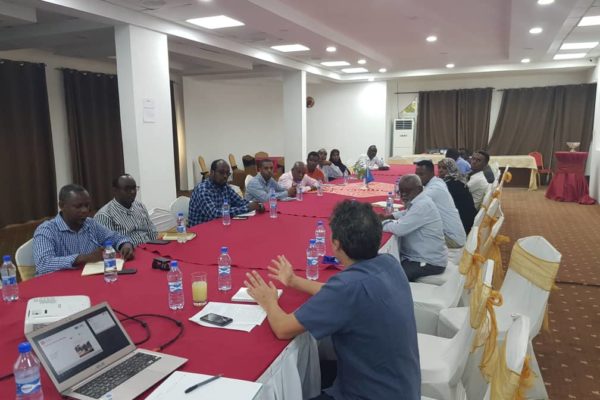Renforcer la résilience du système alimentaire et soutenir une paix durable – Une histoire du Somaliland
Malgré une stabilité relative, le Somaliland continue de faire face à de multiples chocs et menaces, notamment une insécurité alimentaire aiguë récurrente et des conflits liés à des ressources naturelles limitées, en particulier les zones de pâturage et les points d'eau dans les régions de Sool et de Sanaag. Alors que la production animale constitue l'épine dorsale de l'économie du Somaliland, les sécheresses, la dégradation des terres et les chaînes de valeur fourragères sous-développées ont de graves répercussions sur la sécurité alimentaire, la nutrition et le bien-être général. Le conflit dans la région a entraîné l'insécurité alimentaire et la faim, en détruisant les terres agricoles, les fermes et les infrastructures, paralysant tous la stabilité économique. Le besoin récurrent d'interventions humanitaires démontre que la résilience de la population et de son système alimentaire est faible et que les réponses ne sont souvent ni suffisantes ni durables. Les actions visant à améliorer la sécurité alimentaire et la nutrition peuvent contribuer à renforcer la résilience et à maintenir la paix.
Formation sur la prévention et la résolution des conflits : une entreprise conjointe de l'Organisation des Nations Unies pour l'alimentation et l'agriculture (FAO) et Interpeace
En 2020, Interpeace, à travers son principal partenaire au Somaliland, l'Académie pour la paix et le développement (APD), et en collaboration avec la FAO, a organisé conjointement une formation visant à renforcer les capacités des dirigeants traditionnels et locaux en matière de prévention et de résolution des conflits. Celle-ci faisait partie du programme plus large de la FAO sur la résilience en matière de sécurité alimentaire et nutritionnelle (FNS-REPRO), qui vise à utiliser des approches fondées sur les moyens de subsistance et la résilience pour favoriser la paix et lutter contre l'insécurité alimentaire lors des crises prolongées.
- Crédit photo : Interpeace
Elle a émergé des recommandations d'une analyse de contexte multidisciplinaire précédemment menée, qui a aidé l'équipe de la FAO en Somalie à identifier les principaux facteurs de conflit à Sool et à Sanaag, certaines des régions les moins stables du Somaliland et parmi les pires touchés par les crises alimentaires. L'analyse a souligné la concurrence sur les ressources rares (terre, eau et pâturages) comme facteur clé. Les chefs traditionnels et les anciens ont été identifiés comme jouant un rôle important dans la gestion et l'instigation des conflits liés aux ressources.
Les sessions de formation se sont déroulées sur six jours et ont réuni plus de 30 participants, représentant les communautés locales de Sool et de Sanaag. Elles visaient à renforcer la compréhension des conflits par les participants, à les former aux processus de prévention et de résolution des conflits et à les sensibiliser davantage à la nécessité d'y trouver des solutions plus durables. Suivant l'approche d'Interpeace, la formation a défendu des actions plus inclusives dans la résolution des conflits au-delà du rôle des chefs traditionnels et des anciens.
- Crédit photo : Interpeace
Interpeace's strategic engagement with the Food and Agriculture Organization of the United Nations (FAO) to enhance conflict-sensitive and peace responsive programming
The work in Somaliland is a recent activity as part of the strategic partnership between the FAO and Interpeace. In 2017, FAO and Interpeace signed a Memorandum of Understanding – renewed in 2020 - with the overall goal of developing, promoting and strengthening joint programmes and initiatives in support of FAO’s contributions to sustaining peace and conflict prevention. Based on this framework, FAO and Interpeace have collaborated, both at the institutional and field level, in the design and development of projects that are more peace responsive.
Le travail d'Interpeace sur la réactivité à la paix comprend les efforts avec les acteurs du développement et humanitaires pour améliorer leur capacité à opérer dans un contexte fragile ou de conflit afin d'y être plus sensible et de contribuer délibérément à la paix à travers leur programmation technique. Basé sur une approche systémique, il préconise que toutes les composantes de l'aide commencent à travailler sur les conflits d'une manière qui améliore l'impact collectif, dans différents domaines ou secteurs, et se concentre sur les capacités de résilience et de paix déjà existantes dans une société.
